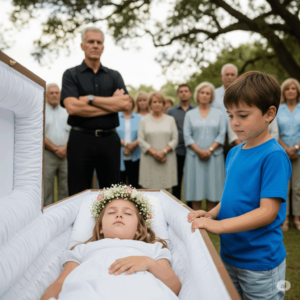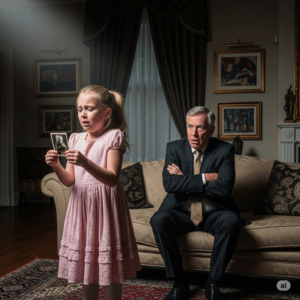My baby was just three days old. I hadn’t even had the chance to name her. And yet, the man I had shared my bed and dreams with looked at me like a stranger. He didn’t say much—just uttered two cold, heartless words:
“DNA test.”
And so… I had to draw blood from my newborn daughter’s hand so he could test whether she was truly his.
Three days after giving birth. The maternity ward was bathed in soft golden sunlight. The cries of newborns rose and fell, blending with the footsteps of nurses and the soft murmurs of other young mothers holding their little ones.
I held my red, fragile baby girl close to my chest, watching her tiny face as she slept peacefully. My eyes stung with tears. She was mine. My flesh and blood. The very essence of a love I once believed was unbreakable.
And yet… after just three days, I was no longer sure if I still had a real family.
Raghav—my husband—stood at the foot of the bed, arms crossed, his eyes full of suspicion.
He didn’t touch the baby.
He didn’t ask how I was after the painful birth.
He stood in silence, a silence I couldn’t understand.
I thought maybe he was in shock, maybe overwhelmed… until I noticed the paper in his hand: a DNA test registration form.
I froze.
“Raghav… what is this?” I asked, my voice trembling.
He didn’t answer. Instead, he quietly pulled out a small glass vial containing rubbing alcohol, cotton balls, sterile gauze, and a tiny needle.
And I understood. He wanted to take our baby’s blood to test her paternity.
“Are you insane? She’s only three days old! She’s so small. How can you even think—”
“Then explain this to me,” he interrupted, his voice hardening.
“Why doesn’t she look like me? Her eyes are light brown, her hair has soft curls, her nose looks like neither yours nor mine. Do you think I’m too blind to notice?”
I looked at our baby. Then back at him. My vision blurred with tears. A flood of pain swept over me, drowning all reason. I was stunned, numb.
“I’ve done nothing wrong,” I whispered. “She’s your daughter. You can doubt me—but please, don’t hurt her. Don’t let her very first wound in life come from her own father’s mistrust.”
He remained unmoved. Instead, he let out a long sigh—like he had held back too much for too long.
“Then prove it.”
I looked at our baby. Her tiny fingers clutched the hem of my gown. Her face still innocent in sleep.
As a mother, I couldn’t bear to let her suffer.
But I also couldn’t stay silent and let her father be consumed by a poisonous doubt.
So I clenched my jaw. I disinfected her tiny fingertip myself. I didn’t dare use the needle. I asked the nurse for a proper infant lancet to draw the blood. A tiny prick, a bead of blood formed. I followed the instructions on the test paper and absorbed the drop into the collection card.
“Here,” I said. “Take it. And may you have enough sense left to accept whatever result you get.”
He took the sample. Without a single word of comfort. Without even glancing at his daughter.
The door closed behind him like a cold, final verdict.
I sat there, baby in my arms, heart empty.
She slept peacefully, unaware that her father had just taken her blood—not out of concern, but to question whether she deserved to be acknowledged.
I cried.
Not because of the humiliation of being doubted—
But because my three-day-old child had already been wounded by the sharp sting of her father’s suspicion.
Three days passed. He didn’t return.
No message. No call.
The maternity ward was now just me and my baby—a newborn not yet a week old, and a mother bleeding on the inside.
I did everything myself: feeding, changing, wiping her down.
At night, she cried. I rocked her for hours under the dim hospital lights.
Sometimes I thought I’d collapse. But every faint breath she took reminded me—
“You have to hold on, Mama.”
The day I was discharged, he returned. Late. Quiet.
In his hand was a sealed envelope—the DNA test result.
I didn’t need to see it. I already knew what it said.
But I still asked, “Did you read it?”
He nodded, eyes lowered.
“I… I was wrong,” he said hoarsely, his voice dry from sleepless nights. “She is mine. 99.999% match. She’s my daughter… no one else’s.”
I said nothing. Our baby lay in the cradle beside me, her eyes wide open, staring up at him—
as if she too were trying to read the face of the man called “father.”
“What do you want now?” I asked.
“I’m sorry,” he whispered. “I know I don’t deserve your forgiveness. But… I want to make it right.”
I laughed. Bitter, dry.
“Make it right? After forcing me to prick our newborn? After doubting your wife’s character over a nose that didn’t look like yours? After abandoning me through every single painful hour of healing, all while I fed, soothed, and cared for our child alone—
with your silence burning a hole in my heart?”
He said nothing.
“Do you even realize that my wounds are not on my body, but deep in my heart?
And worse still, our daughter—she’ll grow up knowing that her father once took her blood to prove she was worth keeping?”
He sank to his knees. Right there in the hospital hallway. He buried his face in his hands and sobbed like a child.
The man I had once loved, once admired for his strength—was now broken before me.
“Can you ever forgive me?” he asked.
I looked at him. Really looked.
He was the father of my child.
But was he still worthy to be called my husband?
I answered with a question:
“What if the result had been different? What would you have done then?”
He looked up, startled.
“I… I don’t know. But I needed to be sure.”
“There you go,” I said. “You were willing to cast aside your wife and child based on a doubt you hadn’t even confirmed.
You chose suspicion over love.
Over fatherhood.
And now… even if you regret it, the wound is already here.”
I didn’t shout. I didn’t cry anymore.
I just felt… empty.
He asked to take us home.
I refused.
Instead, I took our daughter to my parents’ house.
Not to keep her from him—but because I needed time.
To heal.
To find myself again.
And to let him learn that love isn’t just blood—it’s trust.
Three months later.
He visited regularly.
No more excuses.
No more anger.
Just quiet, patient persistence.
He learned how to hold her, change her, rock her to sleep.
She started to recognize his voice, his scent.
I watched it all—my heart torn between sorrow and peace.
One day, she looked up at him and babbled her first word: “Baba.”
He burst into tears. Not from joy. But from knowing…
that his daughter had forgiven him before he even asked.
As for me…
I couldn’t forget.
But I also didn’t want to carry bitterness forever.
So I told him:
“You don’t have to apologize anymore.
If you truly love her, just be the father she deserves.
And maybe… someday…
I’ll learn to trust you again.
But not today.”
Because blood can prove paternity.
But it cannot prove love.
A family isn’t built on DNA—
It’s held together by trust.





